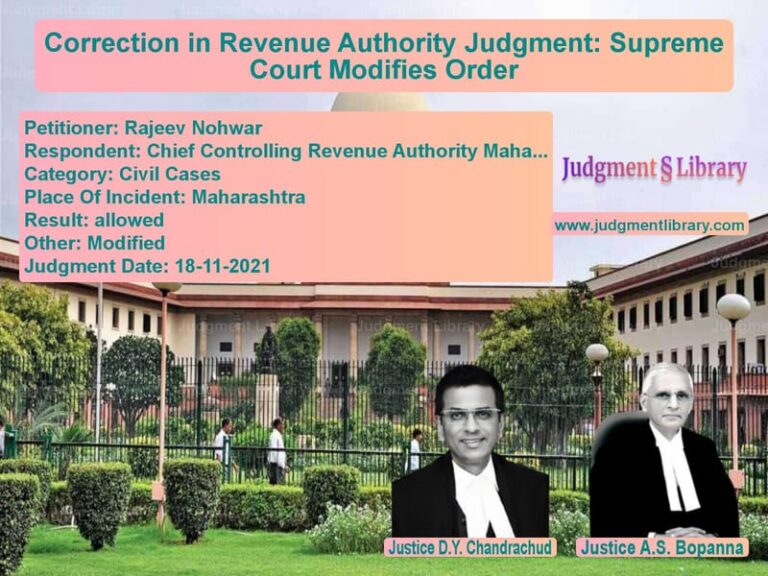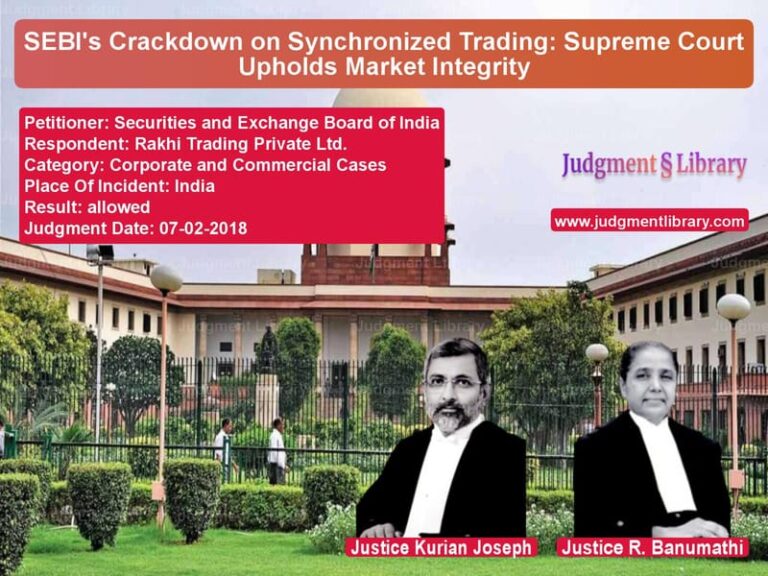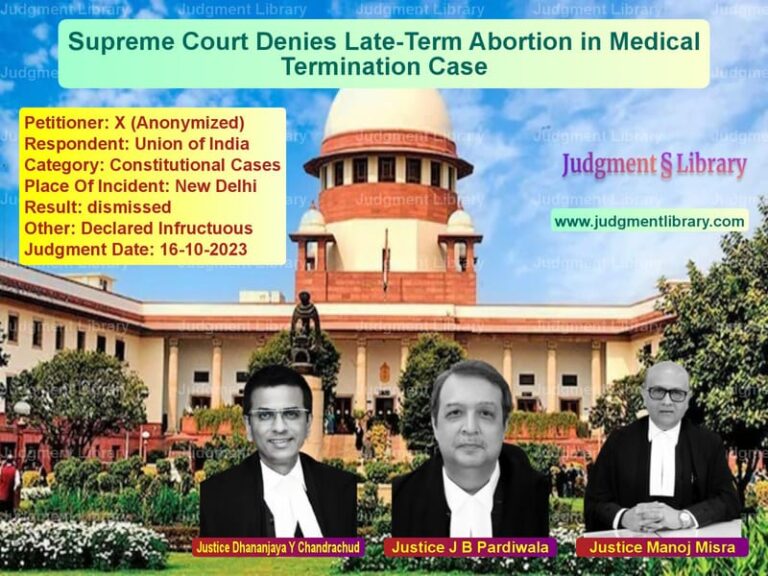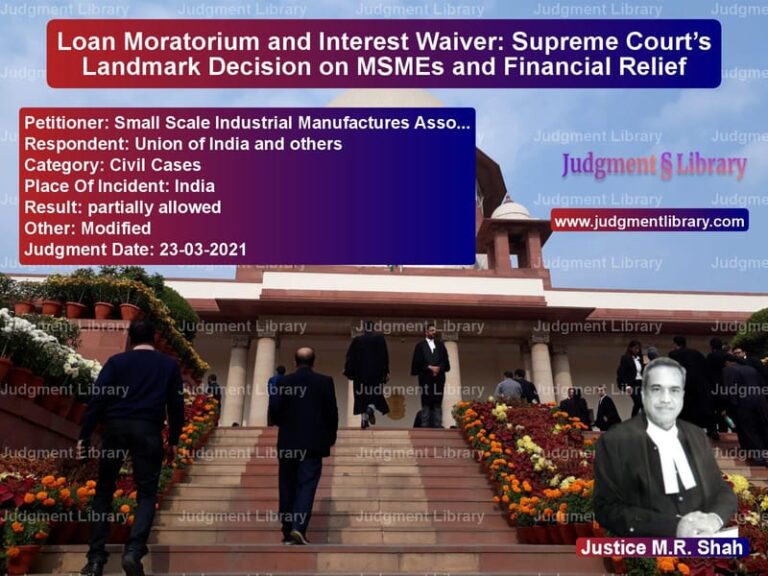Arbitration Agreement Scope: Supreme Court Clarifies Section 11(6A) of Arbitration Act
The Supreme Court of India recently ruled on a significant arbitration case involving the interpretation of Section 11(6A) of the Arbitration and Conciliation Act, 1996. The case, M/s Mayavati Trading Pvt. Ltd. v. Pradyuat Deb Burman, examined whether courts could go beyond merely determining the existence of an arbitration agreement when deciding applications under Section 11 of the Act.
Background of the Case
The dispute arose between M/s Mayavati Trading Pvt. Ltd. and Pradyuat Deb Burman over a commercial agreement that contained an arbitration clause. When differences emerged, the appellant approached the court under Section 11 of the Arbitration Act, seeking the appointment of an arbitrator. The respondent opposed the application, arguing that the claims were barred due to a settlement agreement.
The key legal question was whether, under Section 11(6A), the court could examine issues beyond the existence of an arbitration agreement, such as the validity of claims or allegations of accord and satisfaction.
Arguments of the Appellant
The appellant’s counsel, Mr. Mukul Rohatgi, made the following key arguments:
- Section 11(6A) of the Arbitration Act limits the court’s role to determining the existence of an arbitration agreement.
- The earlier ruling in United India Insurance Co. Ltd. v. Antique Art Exports Pvt. Ltd., which allowed courts to examine additional preliminary issues, was incorrect.
- The existence of an arbitration clause should lead to automatic reference to arbitration, leaving all other issues to the arbitral tribunal.
- The 2019 amendment to the Arbitration Act, which removed Section 11(6A), had not yet come into effect, meaning the existing provision still applied.
Arguments of the Respondent
The respondent’s counsel, Mr. Shyam Divan, countered with the following arguments:
- The court has the authority to examine whether the claims are arbitrable and whether the arbitration agreement remains valid.
- The existence of a settlement agreement barred arbitration, and the court should refuse to appoint an arbitrator.
- The Supreme Court had previously allowed courts to consider issues such as accord and satisfaction before referring cases to arbitration.
Supreme Court’s Analysis
1. Interpretation of Section 11(6A)
The Court analyzed the scope of Section 11(6A), which was introduced in 2015 to limit judicial intervention at the stage of appointment of an arbitrator. The provision states:
“The Supreme Court or, as the case may be, the High Court, while considering any application under sub-section (4) or sub-section (5) or sub-section (6), shall, notwithstanding any judgment, decree, or order of any Court, confine to the examination of the existence of an arbitration agreement.”
The Court ruled that this provision had a clear and narrow meaning: courts could only determine whether a valid arbitration agreement existed, without delving into other issues such as the validity of claims or allegations of settlement.
2. Overruling of United India Insurance
The Supreme Court explicitly overruled the judgment in United India Insurance Co. Ltd. v. Antique Art Exports Pvt. Ltd., which had allowed courts to examine preliminary issues beyond the existence of an arbitration agreement. The Court held:
“It is difficult to agree with the reasoning contained in the aforesaid judgment, as Section 11(6A) is confined to the examination of the existence of an arbitration agreement and is to be understood in the narrow sense.”
3. Impact of the 2019 Amendment
The Court also addressed the fact that the 2019 amendment to the Arbitration Act had omitted Section 11(6A), but since the amendment had not yet come into force, the existing provision remained applicable.
Final Judgment
The Supreme Court ruled in favor of the appellant, holding that courts must confine their inquiry to the existence of an arbitration agreement. The judgment stated:
“The law prior to the 2015 Amendment, which allowed courts to examine additional issues at the appointment stage, has now been legislatively overruled. Courts must only determine the existence of an arbitration agreement, leaving all other issues to be decided by the arbitral tribunal.”
Accordingly, the appeal was dismissed, but the Court granted a one-week extension of the trial court’s status quo order to allow the appellant to pursue other remedies.
Implications of the Judgment
This ruling has significant implications for arbitration law in India. Key takeaways include:
- Court intervention at the arbitration appointment stage is limited to verifying the existence of an arbitration agreement.
- All other disputes, including issues of arbitrability and settlement claims, must be resolved by the arbitral tribunal.
- Earlier precedents allowing courts to examine additional issues have been overruled.
- The judgment strengthens India’s arbitration framework by reinforcing minimal judicial interference.
The Supreme Court’s decision clarifies the role of courts in arbitration and ensures that arbitration agreements are strictly enforced without unnecessary judicial delays.
Petitioner Name: M/s Mayavati Trading Pvt. Ltd..Respondent Name: Pradyuat Deb Burman.Judgment By: Justice R.F. Nariman, Justice R. Subhash Reddy, Justice Surya Kant.Place Of Incident: India.Judgment Date: 05-09-2019.
Don’t miss out on the full details! Download the complete judgment in PDF format below and gain valuable insights instantly!
Download Judgment: Ms Mayavati Trading vs Pradyuat Deb Burman Supreme Court of India Judgment Dated 05-09-2019.pdf
Direct Downlaod Judgment: Direct downlaod this Judgment
See all petitions in Arbitration Act
See all petitions in Dispute Resolution Mechanisms
See all petitions in Enforcement of Awards
See all petitions in Judgment by Rohinton Fali Nariman
See all petitions in Judgment by R. Subhash Reddy
See all petitions in Judgment by Surya Kant
See all petitions in dismissed
See all petitions in supreme court of India judgments September 2019
See all petitions in 2019 judgments
See all posts in Arbitration and Alternate Dispute Resolution Category
See all allowed petitions in Arbitration and Alternate Dispute Resolution Category
See all Dismissed petitions in Arbitration and Alternate Dispute Resolution Category
See all partially allowed petitions in Arbitration and Alternate Dispute Resolution Category







